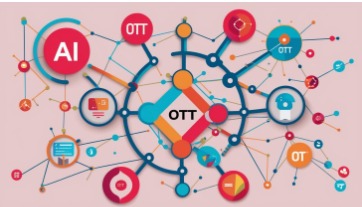
In the golden age of digital content, Over-The-Top (OTT) platforms like Netflix, Amazon Prime, and Disney+ are overflowing with thousands of movies, shows, and documentaries. While this abundance is a dream come true for viewers, it also creates a problem: how do users find exactly what they want to watch without endlessly scrolling? This is where Artificial Intelligence (AI) steps in, acting as the silent force that revolutionizes how users search for and discover content.
Meet Priya, a busy software engineer in her late twenties. After a long day of coding and meetings, she relaxes in front of her smart TV, scrolling through her favorite OTT platform. But tonight, she doesn’t want just any movie—she’s in the mood for a feel-good romantic comedy, preferably something with a strong female lead, and under two hours. She begins typing, “romantic comedy strong woman short…” Before she can finish her thought, the platform suggests “Legally Blonde,” “The Intern,” and “Set It Up.”
How did the app understand her vague search? The answer lies in AI-powered search systems, which use a blend of technologies such as Natural Language Processing (NLP), machine learning, and behavioral analytics to make sense of user input and preferences.
At the heart of the AI search engine is NLP, which allows the platform to interpret human language with context and nuance. Traditional keyword-based search might struggle with a phrase like “movies where the villain turns good,” but AI search models understand the sentiment and intent behind such phrases. They map these into contextual meaning and retrieve relevant results—even if those exact words don’t appear in the movie title or description.
But understanding the query is just one part of the puzzle. OTT platforms also harness machine learning models trained on massive datasets of user behavior. These models analyze what millions of users like Priya have searched, watched, paused, rewatched, or rated. The AI identifies patterns and uses them to refine search results. For example, if a large number of users who search for “strong female lead” end up watching “Hidden Figures” or “Erin Brockovich,” the system learns to associate those titles with that intent, even if the phrase doesn’t appear in their metadata.
Recommendation engines also work hand-in-hand with search. When Priya starts typing, the platform already knows her preferences based on her past activity—she often watches romantic comedies, skips horror, and rarely finishes action movies. This history, combined with data from users with similar tastes, allows the system to present curated results that feel almost intuitive.
Behind the scenes, AI systems are continuously learning and evolving. New content is being added daily, and user preferences shift over time. OTT platforms use real-time data analytics to track these changes. If a new show suddenly goes viral, the algorithm adapts, pushing it higher in search results for relevant queries.
Another innovative use of AI in search is voice recognition. As smart TVs and voice assistants become more common, users like Priya might say, “Show me something fun with a happy ending.” AI-driven voice search translates spoken language into text, interprets the intent, and delivers suitable results—just like its text-based counterpart.
Moreover, AI ensures inclusivity in search. By supporting multiple languages and understanding cultural context, platforms can cater to global audiences. A user in India typing “family drama with emotions” might get Bollywood classics, while someone in Italy using a similar phrase could see local hits that fit the bill.
Of course, these AI systems come with challenges. Bias in training data can skew search results, and maintaining transparency in recommendations is a growing concern. But as AI models become more sophisticated and ethical AI practices evolve, these hurdles are being addressed.
Back in her living room, Priya smiles as she clicks on Set It Up. She didn’t spend 20 minutes scrolling aimlessly like she used to years ago. AI had quietly done its job—understanding her, predicting her needs, and delivering the perfect movie for the moment.
In a world overwhelmed with content, AI is not just a luxury—it’s the compass guiding users through the sea of entertainment. Thanks to intelligent search systems, OTT platforms aren’t just providing content; they’re creating personalized, seamless experiences that make every evening more enjoyable.





